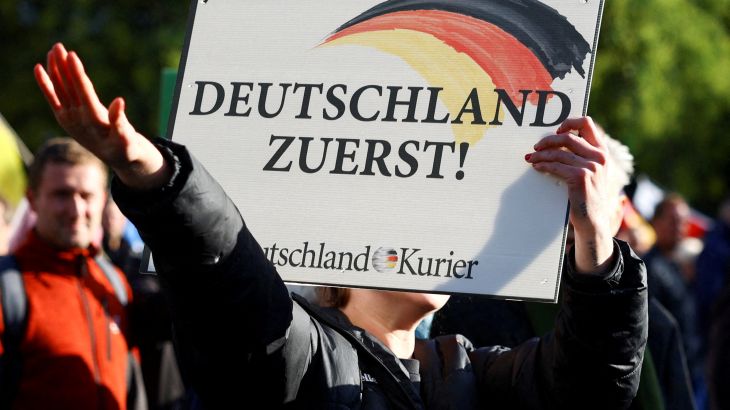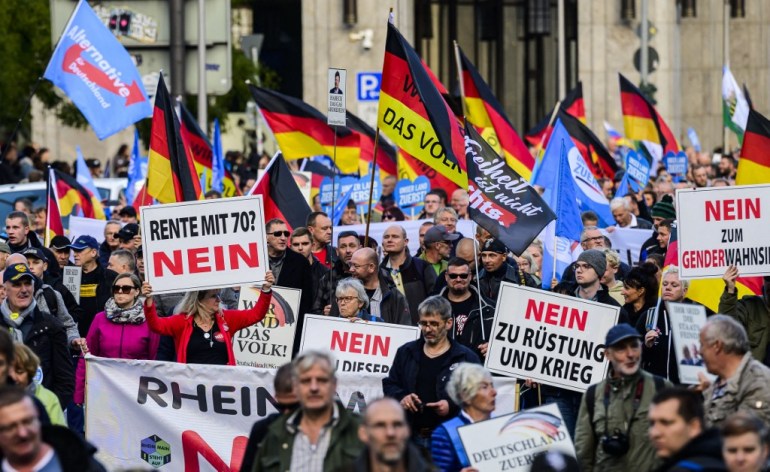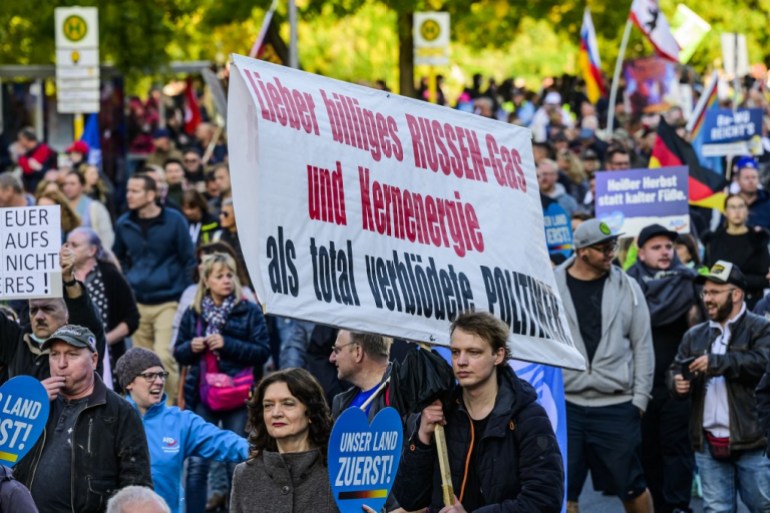Could far-right AfD weaponise Germany’s cost-of-living crisis?
Some fear the Alternative for Germany party could be re-galvanised to regain lost political ground amid the downturn.

Concerns are being raised in Germany about how far Russian sanctions and the subsequent cost of living crisis are creating fertile ground for the country’s populist far-right party, the Alternative for Germany (AfD), to regain lost political ground.
After low poll ratings at the beginning of the year, recent developments and polling data show that the AfD party could be re-galvanised amidst the crisis.
Keep reading
list of 2 itemsGermany to step up surveillance of far-right AfD: Report
In October’s regional elections in the eastern state of Lower Saxony, the AfD gained nearly 12 percent of the votes, an increase compared with previous elections.
Polls, including one by the strategic research company Pollytix, show overall support for the party has gone up from about 11 percent across Germany to nearly 15 percent nationally since July.
The fears come as authorities last week arrested 25 suspected members of the far-right so-called Reich Citizens (Reichsbuerger) movement who were allegedly plotting to overthrow the German government and install a leader who had reportedly sought support from Russia.
Russian gas
As the western European nation most reliant on Russian gas, with more than half of its gas coming from Russia prior to the Ukraine war, Germany has been hit particularly hard since the Russian invasion of Ukraine on February 24.
Citizens have seen gas prices surge to more than 40 percent, which has come alongside an increase in rising living costs.
The country’s inflation rate peaked in October at 10 percent – its highest in 70 years.
Analysts say they are worried about how the crisis could be weaponised by the AfD, which came to prominence amidst Europe’s refugee crisis from 2015 onwards.
Peddling an anti-immigration, anti-Islam narrative, it became the third-largest party in the German parliament in the 2017 federal election.
Amid the current cost-of-living crisis, the party has been positioning itself as the party of the people, protesting against the government’s decision to fight the economic war against Russia.
In October, it organised a huge rally in the capital that, according to police estimates, attracted nearly 10,000 people.
During the rally outside the German Reichstag (parliament), AfD politicians accused the government of waging an economic war against its own people by sanctioning Russia and ignoring the needs of German citizens.
Effective strategy
Wolfgang Schroeder, a political scientist and far-right expert at the University of Kassel, told Al Jazeera that positioning itself as the pro-citizen party that is critical of the government is an effective AfD strategy.
“If you only go by this increase in the polls, it shows that the AfD has done well since the summer to remobilize its party base,” he said.
“The AfD’s message has been that it is not the task of the government to fight for peace and better living conditions for people in other countries, the only real task of this government is to support its own society.”
“The government backing the war against Russia is disappointing people across the country.”
“There is a chance for the AfD to take advantage of that disappointment and further push the message that it is the party advocating for the people and fighting against this government, which is not able to do a good job,” he said.
East-West divide
The crisis has also led to concerns about what it could mean for people living in former East Germany (the German Democratic Republic or GDR), the AfD’s political heartland.
Economic differences continue between the two formerly divided parts of Germany, in areas such as wealth accumulation, wages and pension funds.
Official government data shows that while the economic gap between the two sides has decreased within the last few years, there is still a difference of 18 percent between the two.
The last few months have seen leaders of former eastern states express worries about what the impact the current situation will mean for the economic progress made by the five eastern states – Brandenburg, Saxony, Mecklenburg-Western Pomerania, Saxony-Anhalt and Thuringia – since reunification 30 or so years ago.
Protesters from across the political divide, including the far right, have been taking to the streets every Monday in the east, a tradition in the GDR days, to protest against the crisis, in what has been dubbed in mainstream media and political circles as an “angry winter”.
‘Democratic distance’
David Begrich works at the anti-racism campaign group Miteinander (Together) based in Magdeburg in the former east.
The group works with people on both sides of the former divide to tackle and raise awareness of hard-line far-right thought through workshops, advice, support and intervention programmes.
“The financial reserves and capital accumulation in eastern Germany are lower than in the west, and the contemporary historical experience is also different,” Begrich told Al Jazeera.
“Crises are interpreted against the background of the experience of the systemic upheaval of the 1990s, which West Germans did not experience,” he said. “There is also a measurable mistrust towards the mechanisms of representative democracy in East Germany, in other words, a democratic distance.”

Meanwhile, Jannes Jacobsen, the head of the research cluster data methods monitoring at the German Centre for Integration and Migration Research, told Al Jazeera that the current problem extends beyond historical context.
“It is more about the individual circumstances than the East-West divide. Because what affects people is their individual circumstances and how resilient they are to such external economic shocks,” he said.
“We need to look at factors like their income, net worth, and whether they have to provide for their family or for the elderly to identify whether social structures differ in the east than in the west.”
Schroeder said that while it was a dangerous situation, “whereby more people in the east have more fear about their living conditions and what this could mean for the east-west economic divide”, it was not certain if it would go backwards.
“In recent years, there has been a lot of new investment from industries such as the chemical and tech industries, and if you compare today to how things were 10 years ago, there is a big difference,” he said. “So, I’m not convinced that the economic distance between east and west will deepen amidst this crisis.”
Main issue
With energy and living costs set to remain high in the coming months, analysts agree that the main issue is ensuring stability in the country so the AfD does not regain power.
“The AfD can capitalise on situations and it emotionalises situations. This is not good for our society, but this kind of polarisation has in the past made the AfD strong. But the question remains as to whether they will be able to galvanise support outside of its main base within parts of the east,” Schroeder said.
“The AfD very skillfully exploits people’s fears and prejudices,” Begrich added. “It speaks to the already disenfranchised and stirs up resentment against politics in Berlin in a very sweeping and emotional way.”
“People need a perspective of stability to help them get through the crisis. This is where the government needs to implement a strategic communication policy,” he said.
